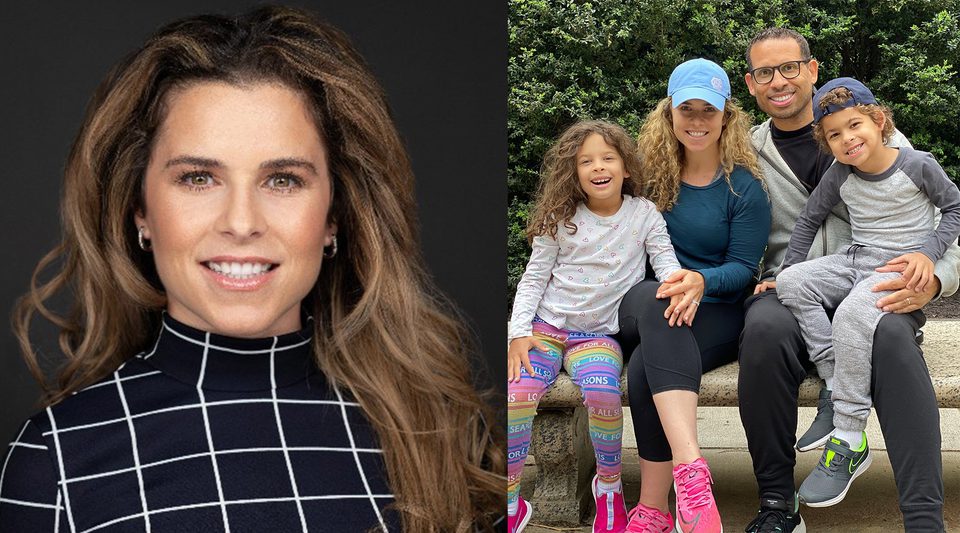‘Your Journey is Your Own:’ Determination, Self-Advocacy Freed Shelby Holloway From a Lifetime of Pain

On the night of her second miscarriage, Shelby Holloway found herself in a Miami hospital on Christmas night. She and her husband, Duane, had been on vacation; she was not quite two months along. And she began to understand, at a young age, how difficult starting a family might be.
But it would be years before she had answers, and a doctor at Magee-Womens Research Institute (MWRI) helped her resolve her unremitting pain, allowing her to be the mother she always knew she could be.
After her miscarriages, when she consulted her doctor, he patted her on the knee and reassured her that he’d once cared for a patient who lost five babies but successfully carried her sixth pregnancy to term.
“He told me I was nice, as if that was a metric for having a baby,” Shelby recalled.
It was starting to become an all-too-familiar refrain. A competitive athlete, Shelby came from a long line of women who had no trouble getting pregnant. When people looked at her, they saw a fit and healthy young woman; they didn’t see someone who had endured severe, chronic pain since puberty. They didn’t see a woman who found out about her first miscarriage when the ultrasound flatlined at eight weeks, causing the technician to excuse herself and hurry out in search of a doctor.
They didn’t see a woman who went to her husband after her second miscarriage and told him, her whole heart on the line, “if you want to be with someone who can give you babies, it’s OK.”
The marriage survived; in fact, it thrived, despite a third miscarriage. Their partnership grew stronger as they embarked on their journey. For Duane, children represented a fulfillment of purpose; for Shelby, it was the chance to raise good contributors to society, to raise people who were better than she and her husband were. And she was determined to see it through.
“The world is not fair, and because I’m nice, that doesn’t mean I get to have babies,” she said. She decided she was no longer going to suffer in silence, and she began seeking information, embracing the premise that knowledge is power.
The road to motherhood
Because she had no difficulty getting pregnant, she learned that her problem was carrying the baby, not conceiving. Shelby had a severely retroverted biconuate uterus, meaning it was both tipped and heart-shaped. She also tested positive for MTHFR, a genetic mutation that leads to blood clotting problems and can also cause miscarriages and other pregnancy complications.
Eventually, Shelby and Duane were able to conceive their children through a combination of in vitro fertilization and the help of a surrogate to carry their babies: twins, a boy named Ethan and a girl named Mira. Though born prematurely, they were both released from the neonatal intensive care unit within three weeks, and they are thriving today.

Finally, it was Shelby’s time. Despite the joy of finally experiencing motherhood, she continued to experience terrible periods with heavy bleeding and pain comparable to labor without an epidural.
“Why am I suffering like this?” she asked herself. “In one sense, I feel like we’re really failing women. We’re expected to endure and have all this pain. There is a tremendous double standard.”
When the children turned 4, the family moved to Pittsburgh, where Shelby found Suketu Mansuria, MD, and Magee-Womens Research Institute. Instantly, she felt something different: she felt seen.
“I didn’t need to be coddled. I didn’t want pity. I wanted a problem solver,” she said. “I felt like he was the first doctor who understood what I needed. I didn’t need someone to tell me I was nice. I didn’t need someone to tell me I was fit. I was all about science: facts, data, discovery. That’s what I wanted in my doctor.”
At last, answers
Dr. Mansuria is part of the Center for Endometriosis and Chronic Pelvic Pain at UPMC Magee-Womens Hospital, one of the few facilities of its kind in the country. Immediately, he recognized Shelby’s symptoms as classic signs of adenomyosis, a disease in which the tissue that normally lines the uterus instead grows into the muscular wall of the uterus. There, the tissue thickens the muscular wall of the uterus, creating heavy and painful periods.
She also had endometriosis, where the uterine lining implants outside the uterus in the abdomen; it had actually wrapped around her ureter, the structure that connects the kidney to the bladder.
Dr. Mansuria removed Shelby’s uterus, leaving her ovaries so she would not enter menopause, and removed all the endometriosis. For Shelby, it was life changing.
“I feel like I became a woman once I had my partial hysterectomy,” she said. “I am the best version of myself: I am the healthiest, and I am the happiest. I’m able to be the mother I always wanted to be without having to tough it out.”
Dr. Mansuria said her experience is not uncommon.
“We see a lot of patients like Shelby who are frustrated and are unfortunately never really given a diagnosis,” he said. “Women are classically the caretakers, they’re told to suck it up and take care of the family needs.”
To help future patients, Dr. Mansuria is pursuing research that could better diagnose adenomyosis without surgery. Currently, the only definitive way to know is to look at the uterine tissue after a hysterectomy. In one project, he is working with biomechanical engineers to see if an ultrasound could objectively assess the uterus, which tends to be “spongier” in adenomyosis patients.
“Hopefully it will allow patients to make better, more informed decisions about whether to go through with surgery or try something else,” Dr. Mansuria said, adding that linking patients like Shelby to research at MWRI will help inform treatments in the future.
For Shelby, the long road to her family’s creation — and to her own wellness — was the journey of a lifetime.
“I couldn’t even see the top of the mountain, and it did not matter,” she said. “The summit of my mountain was my hysterectomy. I want women to know that you don’t have to suffer in silence, or alone. I want women to know that your journey is your own.”
Be the First to Know
Get the latest research, news, events, and more delivered to your inbox.